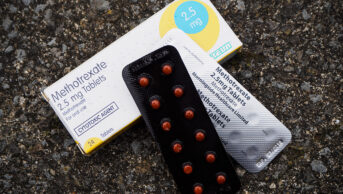
Shutterstock.com
Researchers have recorded a large increase in the proportion of patients supplied with antibiotics by pharmacists for sore throats during the COVID-19 pandemic.
Preliminary data from the Welsh community pharmacies suggest that the rate of antibiotic supply more than doubled during the peak of the COVID-19 pandemic, when remote consultations were more widely used and routine point-of-care testing was not carried out.
The figures, published in the Journal of Antimicrobial Chemotherapy on 17 January 2022, show that antibiotic supply increased from only 27% of patients under the Sore Throat Test and Treat (STTT) service between November 2018 and September 2019, to 63% of patients between November 2020 and May 2021.
Under the STTT service, which was launched in November 2018 as a pilot and has since been rolled out to all health boards in Wales, patients presenting to community pharmacists with sore throat symptoms are offered rapid antigen detection testing to determine if the infection is viral or bacterial.
Ordinarily, those with viral infections are given advice on symptom relief and recovery, whereas those found to have a bacterial infection, such as group A streptococcal, are prescribed antibiotics.
However, the STTT service was temporarily suspended in March 2020 during the COVID-19 pandemic and the use of remote consultations increased, meaning that pharmacists were able to supply antibiotics to patients who met certain criteria for symptoms of bacterial infection without requiring a rapid antigen detection testing to establish the nature of the infection.
The researchers concluded that community pharmacy point-of-care testing for sore throat could lead to a reduction of 36 courses of antibiotics for every 100 consultations.
The authors said: “Changes to the delivery model necessitated by the COVID-19 pandemic reduced the number of steps prior to community pharmacists offering antibiotics, and consequently the number of opportunities to rule out GAS infection and target antibiotics more appropriately.
“Data from this study suggest that community pharmacists were significantly more likely to offer antibiotics when they relied on clinical scoring without a point-of-care test.”
Guidelines from the National Institute for Health and Care Excellence (NICE) do not recommend routine use of rapid tests for streptococcal A infections in GP settings because it says current evidence for their effect on improving antimicrobial prescribing and stewardship is limited, compared with clinical scoring tools alone.
However, study author Efi Mantzourani, lecturer in pharmacy practice at Cardiff University School of Pharmacy and Pharmaceutical Sciences, said that the study, as well as previous work by her team, provides a contribution towards developing an evidence base for the use of rapid antigen testing in the community pharmacy STTT.
Philip Howard, vice president of the British Society for Antimicrobial Chemotherapy, said that the study “really does add to the evidence base”.
“The original work done with doctors did not show any benefit of adding in a POC RAD [rapid antigen detection] test, but these tests are used more widely across Europe to further reduce inappropriate antibiotic use.”
The study comes as an analysis published in The Lancet on 19 January 2022 found that 1.3 million deaths in 2019 were directly attributable to bacterial antimicrobial resistance (AMR), with the researchers describing AMR as “a leading cause of death around the world”.
- This article was amended on 24 January 2022 to clarify that Efi Mantzourani, lecturer in pharmacy practice at Cardiff University School of Pharmacy and Pharmaceutical Science, is a woman.
Read more: Sore throat testing could be next step for ‘Pharmacy First’, says chief pharmacist for Scotland
2 comments
You must be logged in to post a comment.



Dr Efi Mantzourani is a woman, not a man. Please correct this.
Thank you for bringing that to our attention Cheryl. We've corrected our mistake.
Graham Clews, News Editor